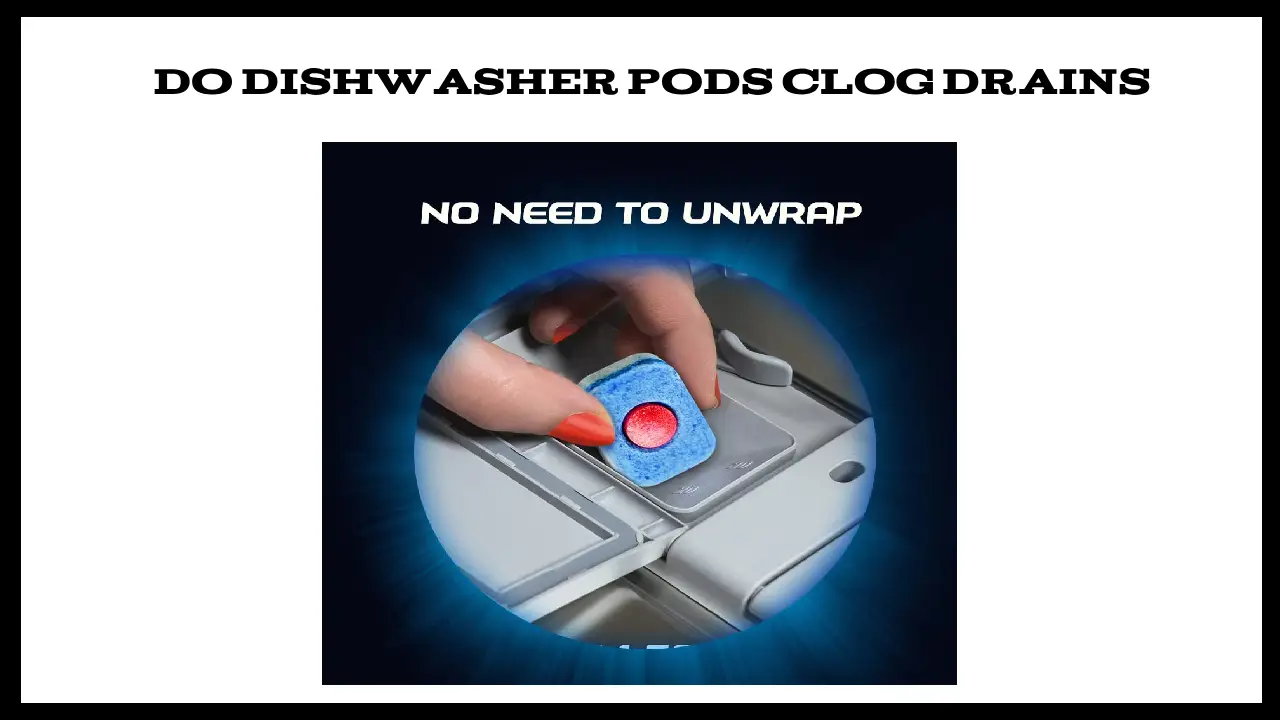Have you ever thought about if dishwasher pods can clog your drains? Many people have wondered the same thing as these convenient cleaners become more popular. We’ll look into how dishwasher pods and drain clogs are linked. You’ll get tips on how to prevent and fix any issues.
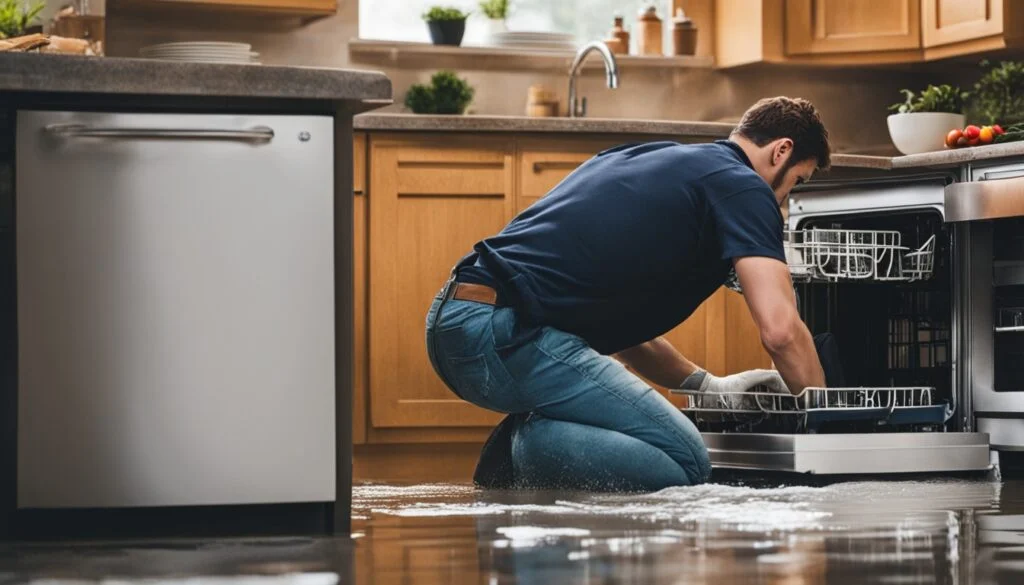
A close-up of colorful dishwasher pods arranged neatly in a dish, surrounded by sparkling water droplets, with soft lighting highlighting their textures and vibrant colors, against a clean kitchen countertop background.
Table of Contents
Key Takeaways
- Dishwasher pods can potentially contribute to drain clogs, but they are not the sole cause of this problem.
- Understanding the composition and proper usage of dishwasher pods can help you avoid drain-related issues.
- Regularly maintaining your dishwasher and drains, as well as properly disposing of food particles and grease, are essential steps in preventing clogs.
- There are natural and chemical remedies available to unclog a drain, but it’s important to use them cautiously and as a last resort.
- Exploring alternatives to traditional dishwasher pods, such as eco-friendly options, can also help minimize the environmental impact and potential plumbing problems.
What Are Dishwasher Pods?
Dishwasher pods are a popular and convenient form of dishwasher detergent. They are compact and pre-measured, making them easy to use. These units are designed to simplify the dishwashing process, which is why many homeowners prefer them.
They are made of cleaning agents, enzymes, and other ingredients all in one package. This makes them a preferred choice for many.
Composition and Design
The composition of dishwasher pods is carefully made to clean effectively. They have surfactants, builders, and other ingredients. These work together to remove tough food and grease from dishes.
The pods are compact and pre-measured. This means you always use the right amount of detergent. It helps avoid using too much or too little detergent.
Convenience and Popularity
Dishwasher pods are getting more popular because they are so convenient. People like how easy they are to use and how well they clean. They make dishwashing simpler by eliminating the need to measure and pour detergent.
This convenience has made dishwasher pods a favorite in many American households.
| Feature | Benefit |
|---|---|
| Pre-measured Doses | Ensures the right amount of detergent is used for each load, reducing waste and over-dosing |
| Compact Design | Saves space in the dishwasher and under the sink, making storage and organization easier |
| Specialized Formulation | Provides effective cleaning power to remove even the toughest food and grease stains |
| Ease of Use | Simplifies the dishwashing process, making it more convenient for busy households |
Dishwasher pods are a top choice for many because of their design, cleaning power, and time-saving benefits. As people look for easy cleaning solutions, dishwasher pods will likely stay popular.
Do Dishwasher Pods Clog Drains?
Many homeowners worry if dishwasher pods can cause drain clogs. Drain clogs can be a big problem, leading to hassle and expensive fixes. Let’s look into if dishwasher pods really lead to blocked drains.
Dishwasher pods dissolve quickly in hot water, making them effective cleaners. They have surfactants, enzymes, and other cleaners to prevent residue on dishes and in the dishwasher. But, some worry if these ingredients could harm household plumbing.
| Potential Causes of Drain Clogs | Impact of Dishwasher Pods |
|---|---|
| Food particles and grease | The cleaning agents in dishwasher pods can help break down and wash away food particles, reducing the risk of clogged drains. |
| Improper disposal of solid waste | If large pieces of food or other solid materials are washed down the drain, they can contribute to drain clogs, regardless of dishwasher pod usage. |
| Buildup of detergent or soap residue | Dishwasher pods are designed to dissolve completely, minimizing the risk of residue buildup in drains. |
Studies show that dishwasher pods don’t usually cause drain clogs. The pods’ ingredients are made to clean well without harming plumbing. Yet, using or throwing away pods wrong, or other issues, can still block drains. Keeping up with maintenance and proper disposal helps avoid these problems.

“Close-up of colorful dishwasher pods nestled in a clear glass container, surrounded by sparkling water droplets, with a shiny stainless steel kitchen sink in the background.”
In summary, dishwasher pods are rarely to blame for drain clogs. Using and throwing away pods right, and regular plumbing care, are key to a working drainage system at home.
Common Causes of Drain Clogs
Clogged drains can be a big headache at home. Knowing what causes them helps in preventing and fixing them. Food particles and grease, along with wrong disposal of dishwasher pods, are the main culprits.
Food Particles and Grease
Leftover food from dishes can get into the drain during washing. Over time, these bits build up and block the drain. Grease from cooking also sticks to the pipes, making clogs worse.
These blockages can harden and become tough to clear, causing ongoing drainage issues.
Improper Disposal
Dishwasher pods are made to dissolve and clean dishes. But their residue can cause problems if not thrown away right. Flushing the pod’s contents down the drain can lead to more drain clogs.
It’s important to dispose of any leftover pod material correctly to keep drains clear.

A close-up view of a kitchen sink with water pooling around the drain, showcasing various materials causing a clog, such as food debris, grease, and colorful dishwasher pods partially dissolved, all in a realistic and detailed style.
“Addressing the root causes of drain clogs, such as food particles, grease, and improper disposal, is the key to preventing and resolving these common household issues.”
Knowing what causes drain clogs helps homeowners take steps to keep their plumbing in good shape. This can save money on repairs later.
Signs of a Clogged Drain
Dealing with a clogged drain can be frustrating. But, knowing the signs early can help you fix it before it gets worse. Slow draining water and gurgling sounds are key indicators of a clog.
Slow draining water is a clear sign of a clog. If your sink, shower, or tub takes longer to drain, something is blocking the flow. Hair, soap scum, or debris can cause this.
Gurgling sounds from your drain mean air is being pushed back up through the pipe. This happens when a blockage is present. You might hear this when you use the drain or flush the toilet.
- Slow draining water
- Gurgling sounds coming from the drain
- Water backing up in the sink, shower, or tub
- Unpleasant odors emanating from the drain
A clogged drain can also cause water to back up. If water pools or rises slowly, the pipe is blocked. The water has nowhere to go.
Lastly, a clogged drain might smell bad. This smell comes from organic matter or debris that breeds bacteria.
Knowing these signs of a clogged drain lets homeowners act fast. Fixing it early keeps your plumbing working well and prevents damage.
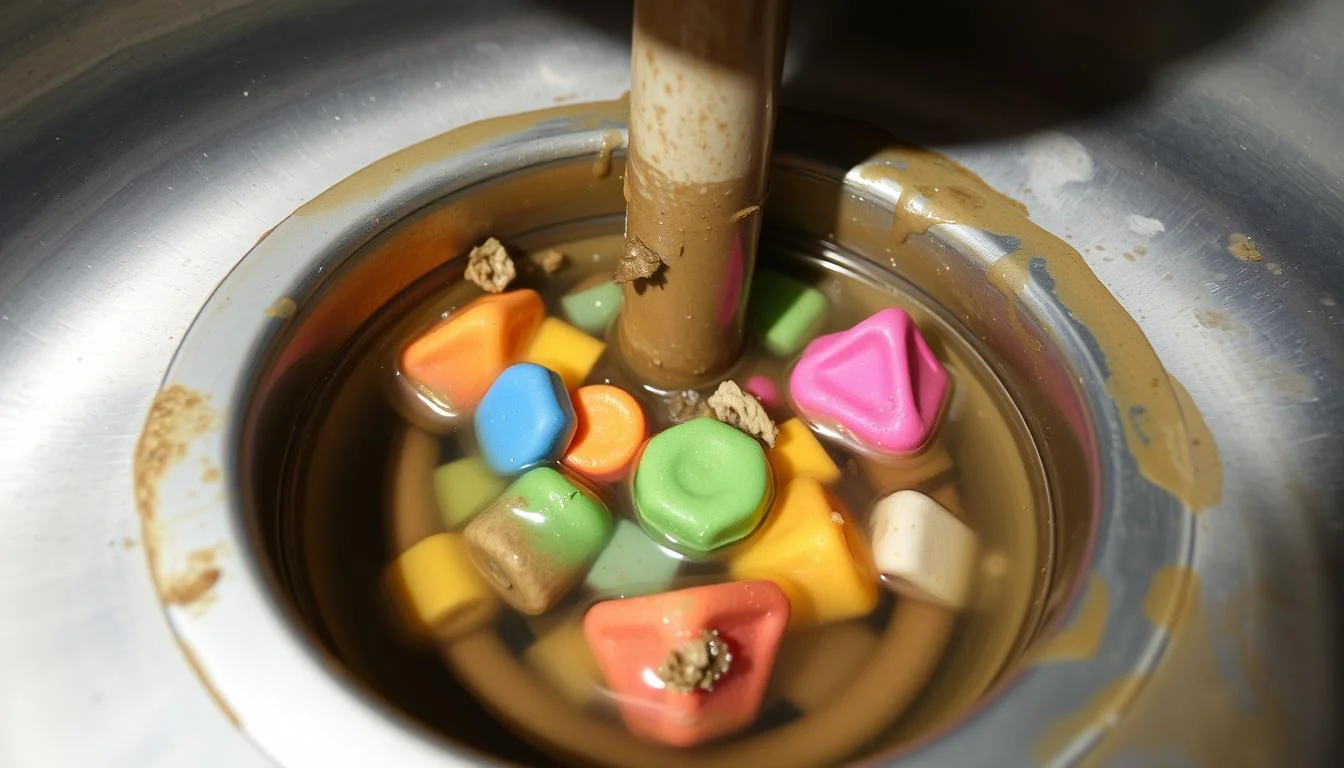
A close-up of a clogged kitchen drain, water pooling, debris and colorful dishwasher pods visible in the pipe, with a backdrop of a stainless steel sink, subtle shadows highlighting the texture of the grime.
Preventing Drain Clogs
Keeping your plumbing system in good shape is key for any home. Preventing drain clogs is a big part of this. By taking a few easy steps, you can lower the chance of clogs and keep your dishwasher working well.
Proper Pod Usage
Using dishwasher pods correctly is important for avoiding clogs. Avoid overloading the dishwasher with too many pods, as this can lead to excess suds and residue buildup in the drain. Also, make sure to follow the pod instructions carefully. Using the right amount helps prevent clogs.
Regular Maintenance
Keeping your dishwasher and its parts clean is key to avoiding clogs. This means:
- Cleaning the dishwasher filter often to get rid of food particles or debris that could block the drain.
- Checking the dishwasher’s spray arms to make sure they’re not blocked.
- Running a cleaning cycle with a dishwasher cleaner now and then to clear out residue or mineral deposits.
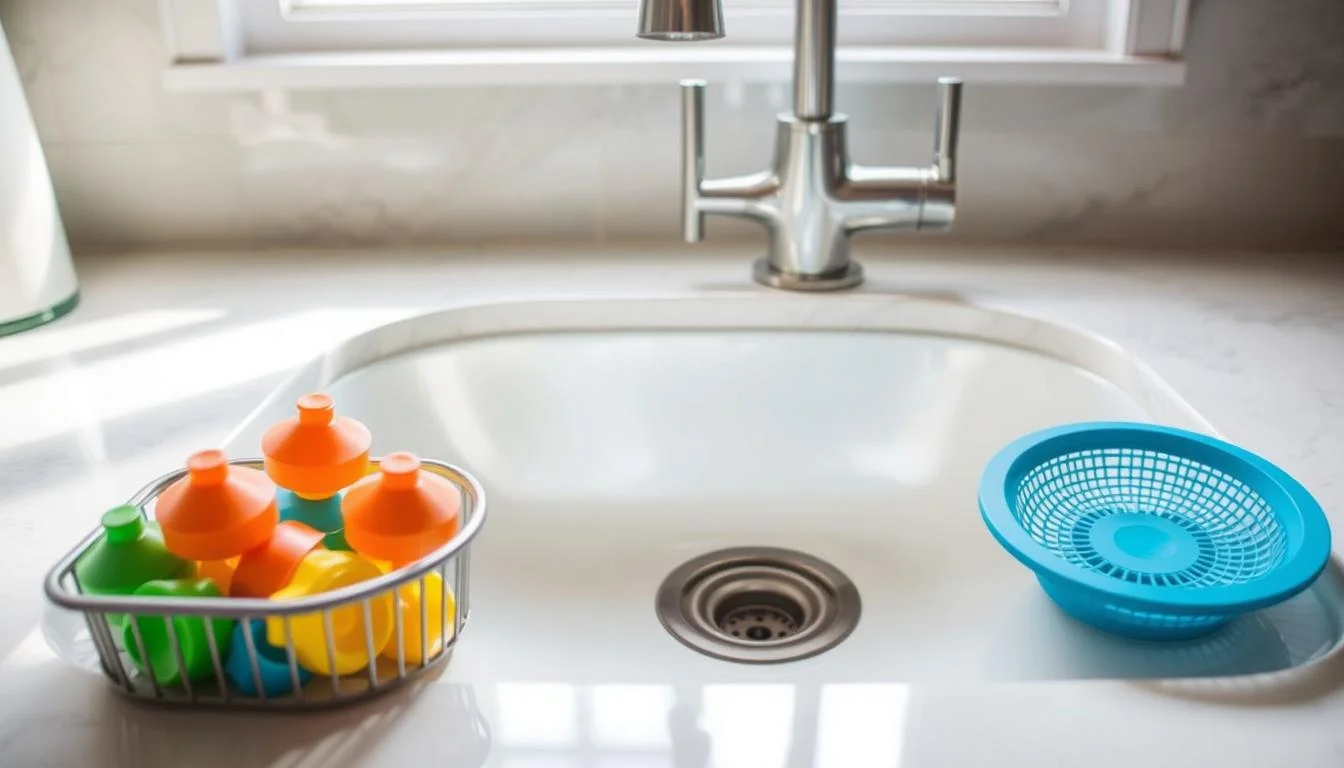
A serene kitchen scene with a focus on a gleaming sink and drain, surrounded by colorful dishwasher pods neatly arranged in a small container, while preventive measures like mesh strainers and drain covers are visible; soft natural light filtering through the window, highlighting the cleanliness and organization.
By doing these simple things, you can stop drain clogs and keep your dishwasher running well for a long time.
Unclogging a Drain
Dealing with a clogged drain can be frustrating. But, there are several ways to fix it. You can use natural remedies or chemical cleaners, depending on what you prefer.
Natural Remedies
For eco-friendly and cost-effective ways to unclog drains, try natural remedies. Popular methods include using baking soda and vinegar, plunging the drain, or a wire coat hanger to clear the blockage. These are good for minor clogs and can help before using stronger solutions.
Chemical Drain Cleaners
If natural methods don’t work, you might need chemical cleaners. These products have strong chemicals that break down clogs caused by grease and other debris. But, be careful with these products as they can harm the environment and your skin. Always read and follow the instructions on the label.
| Natural Remedies | Chemical Drain Cleaners |
|---|---|
| Baking soda and vinegarPlungingWire coat hanger | Dissolve organic matterEffective for stubborn clogsFollow manufacturer’s instructions |
It’s crucial to act fast when your drain is clogged to avoid more problems. Knowing the different ways to unclog can help you fix the issue quickly and keep your pipes flowing well.
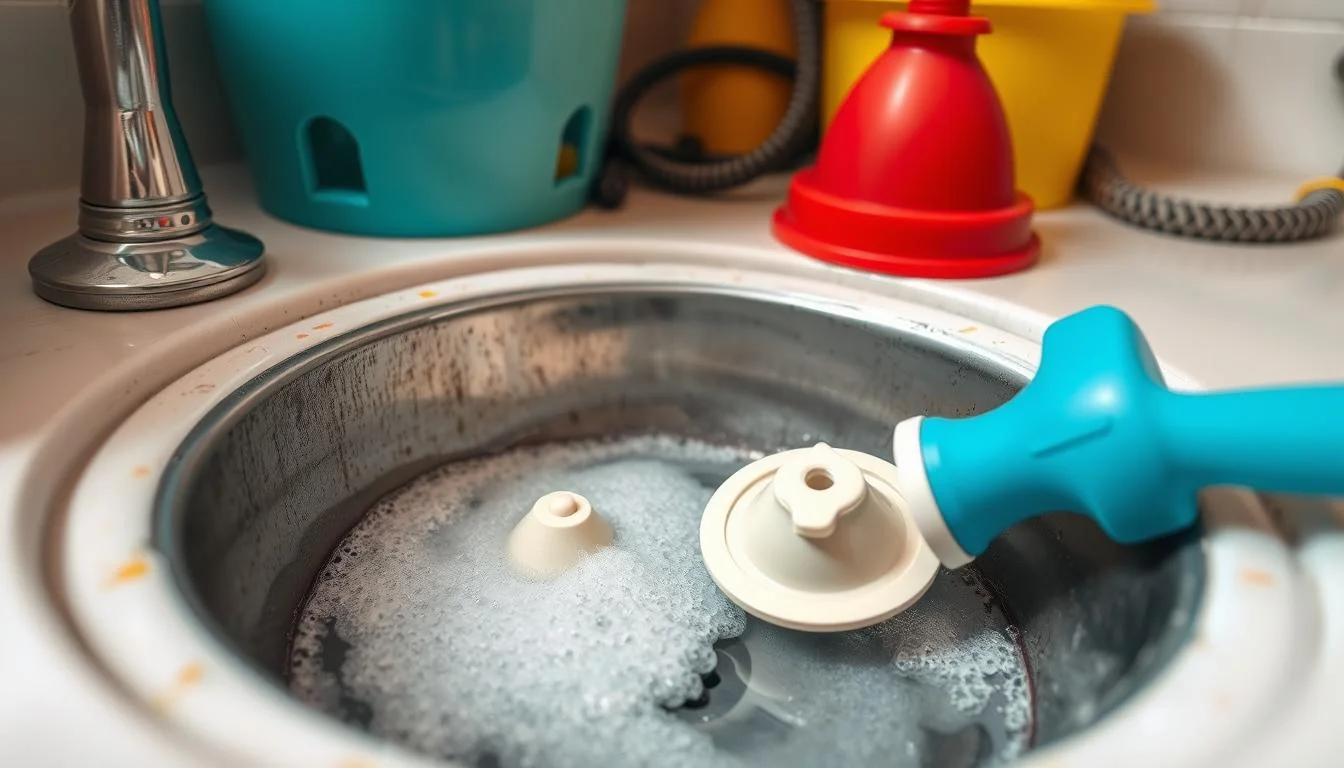
A close-up view of a kitchen sink with a partially clogged drain, showing a dishwasher pod sitting at the edge of the drain surrounded by sudsy water, a plunger resting nearby, and various tools like a snake and bucket in the background, emphasizing the theme of unclogging drains in a vibrant and clean setting.
Environmental Impact of Dishwasher Pods
Dishwasher pods are getting more popular, but we need to think about how they affect the environment. These pods, like other cleaners, can harm the planet because of the chemicals they have and the waste they create.
Dishwasher pods often have chemicals that can hurt the environment. They have synthetic detergents, fragrances, and other additives that can pollute water and soil. This pollution can mess up ecosystems and harm the planet for a long time.
The packaging for dishwasher pods is often made of plastic or other materials that don’t break down easily. This means more plastic waste, which is a big problem. It can take years for this waste to decompose, making things worse.
“The environmental impact of dishwasher pods is a complex issue that requires careful consideration. As consumers become more aware of sustainable alternatives, the industry will likely need to adapt to meet the demands for more eco-friendly cleaning solutions.”
To lessen the harm from dishwasher pods, people can look for greener cleaning options. These might be eco-friendly detergents or making your own cleaners at home. These options use natural ingredients and don’t rely on harmful packaging, making them better for the planet.
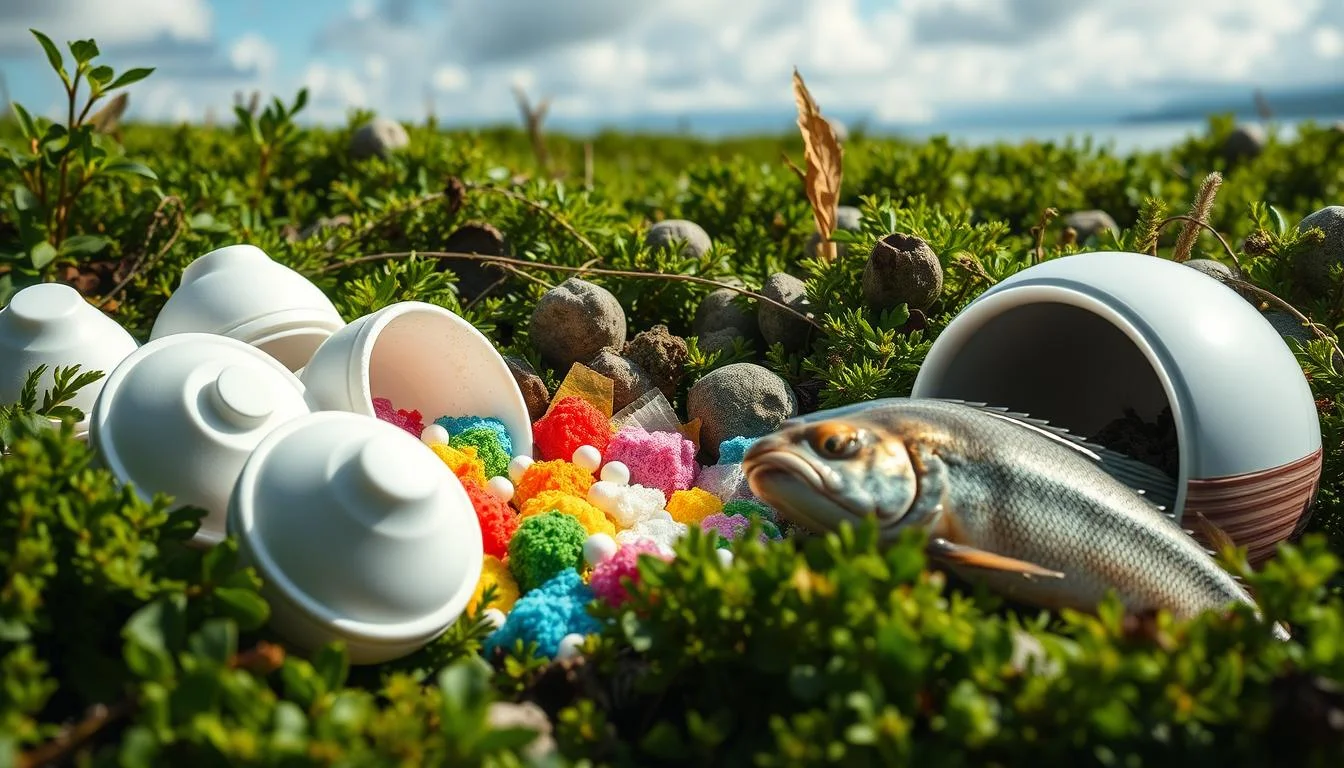
A visually striking representation of dishwasher pods surrounded by nature, with broken pods spilling colorful, toxic-looking substances into a lush green environment, illustrating the contrast between convenience and ecological harm, alongside marine life affected by pollution, encroaching onto a serene kitchen landscape.
By spreading the word and choosing greener products, we can all help reduce the harm from dishwasher pods. This can lead to a healthier planet for the future.
Alternatives to Dishwasher Pods
Many people are looking for other dishwashing detergents because of concerns about clogs and the environment. They are turning to traditional detergents and eco-friendly options. These alternatives are seen as a better choice for the planet.
Traditional Detergents
Traditional detergents, whether liquid or powder, are a good option for avoiding pod problems. They have been around for years and are easy to find. They also tend to be cheaper than dishwasher pods. Plus, they clean dishes well without the risk of clogging drains.
Eco-Friendly Options
Eco-friendly dishwasher detergents are becoming more popular. They use ingredients that are better for the earth, like plants and things that break down easily. These detergents often come in concentrated forms, which means less packaging and less harm to the environment.
When looking at dishwasher detergent alternatives, think about what matters most to you. Consider how well they clean, their price, and their effect on the planet. By choosing wisely, you can find a detergent that works well and helps the environment.

A serene kitchen scene featuring eco-friendly dishwasher detergent in a glass bottle, surrounded by natural ingredients like lemon slices, herbs, and sea salt, with wooden utensils and a clean dish drying rack in the background, soft natural light filtering through a window.
“Choosing the right dishwasher detergent can have a significant impact on the environment and the efficiency of your appliance.”
Tips for Choosing the Right Dishwasher Pod
When picking dishwasher pods, think about what you need for your dishes. Look at the cleaning power and how it affects the planet. The right pod can change how well and efficiently you wash your dishes.
Evaluate Your Cleaning Needs
First, look at the dirt and stains on your dishes. Do you often deal with stuck-on food, greasy items, or fragile glassware? Different pods are made for different cleaning tasks. It’s important to know what you need.
Consider Product Features
Dishwasher pods have many features like rinse aids, enzyme boosters, and special formulas for tough stains. Make sure to check the details to pick one that fits your needs and likes.
Prioritize Eco-Friendly Options
If you care about the planet, look for pods with natural, biodegradable ingredients. These pods clean well but are better for the earth.
Evaluate Cost and Value
The price of dishwasher pods can vary. Think about what you get for your money. Choose pods that are good quality, work well, and are affordable. This way, you get the most value.
| Feature | Benefit |
|---|---|
| Enzyme Boosters | Helps break down tough, baked-on food and grease |
| Rinse Aid Included | Ensures spotless, streak-free dishes |
| Fragrance-Free | Ideal for those with sensitive skin or allergies |
| Eco-Friendly Ingredients | Reduces environmental impact |
Think about these points to pick the best dishwasher pods for you. Consider your cleaning needs, budget, and how you feel about the environment.
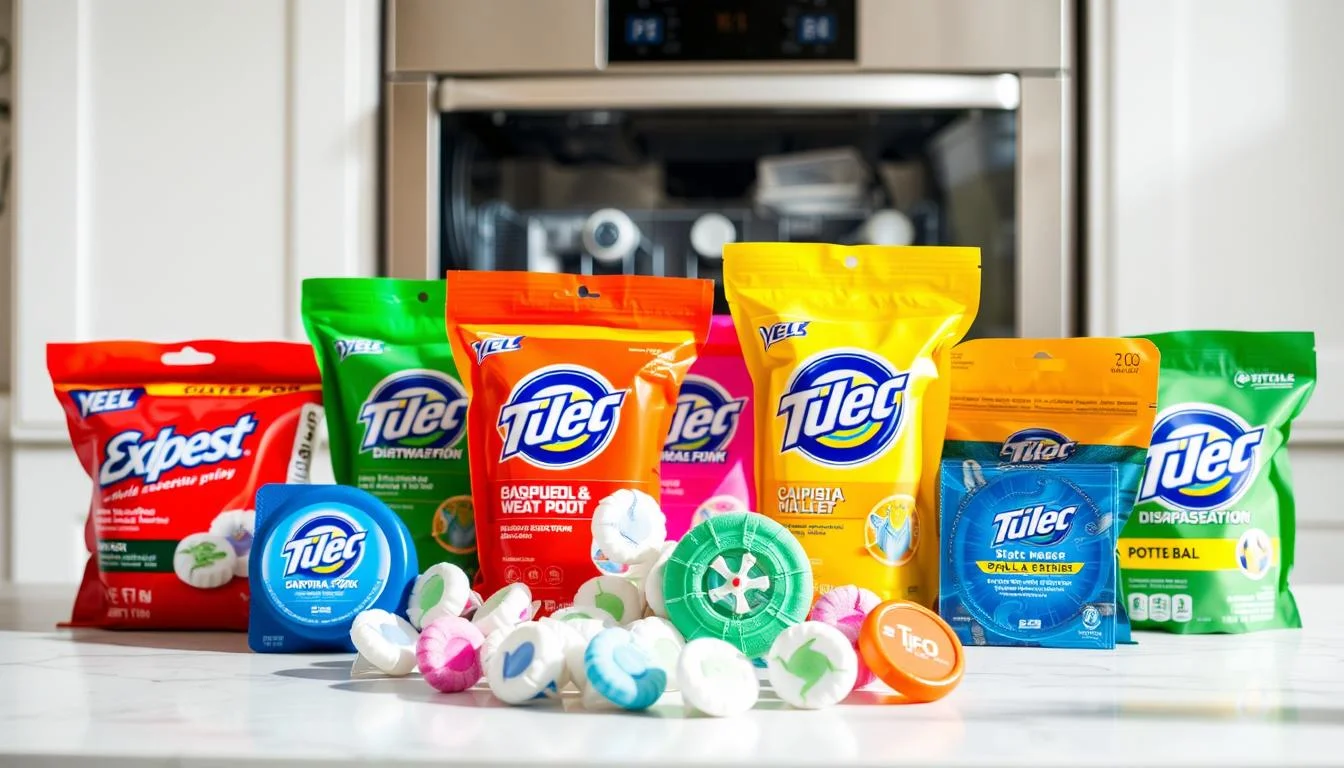
A visually appealing arrangement of various dishwasher pods in vibrant colors, featuring different packaging designs and textures, set against a clean kitchen countertop with a sparkling, modern dishwasher in the background, soft natural lighting illuminating the scene, emphasizing the variety and choices available for consumers.
Proper Disposal of Dishwasher Pods
It’s important to dispose of used dishwasher pods the right way to avoid clogs and protect the environment. These pods are handy for cleaning but can be tricky if not thrown away correctly.
Here are some tips for safe and green disposal:
- Empty the pod: Make sure the pod is empty after washing dishes.
- Recycle the pod: See if your area recycles dishwasher pods. Many places now have recycling for these plastics.
- Avoid flushing down the drain: Don’t put dishwasher pods in the drain to prevent clogs and harm the environment.
- Dispose of in the trash: If recycling isn’t an option, put the pod in the trash for proper disposal.
By doing these things, you help with dishwasher pod disposal, waste management, and environmental responsibility. It keeps your plumbing working well and protects nature from harm.
| Disposal Method | Benefits | Drawbacks |
|---|---|---|
| Recycling | Reduces waste, supports sustainability | May not be available in all areas |
| Trash Disposal | Convenient, widely available | Contributes to landfill waste |
| Drain Disposal | None | Clogs pipes, harms the environment |
Follow these tips and choose responsible dishwasher pod disposal to help the planet and keep your plumbing in good shape.
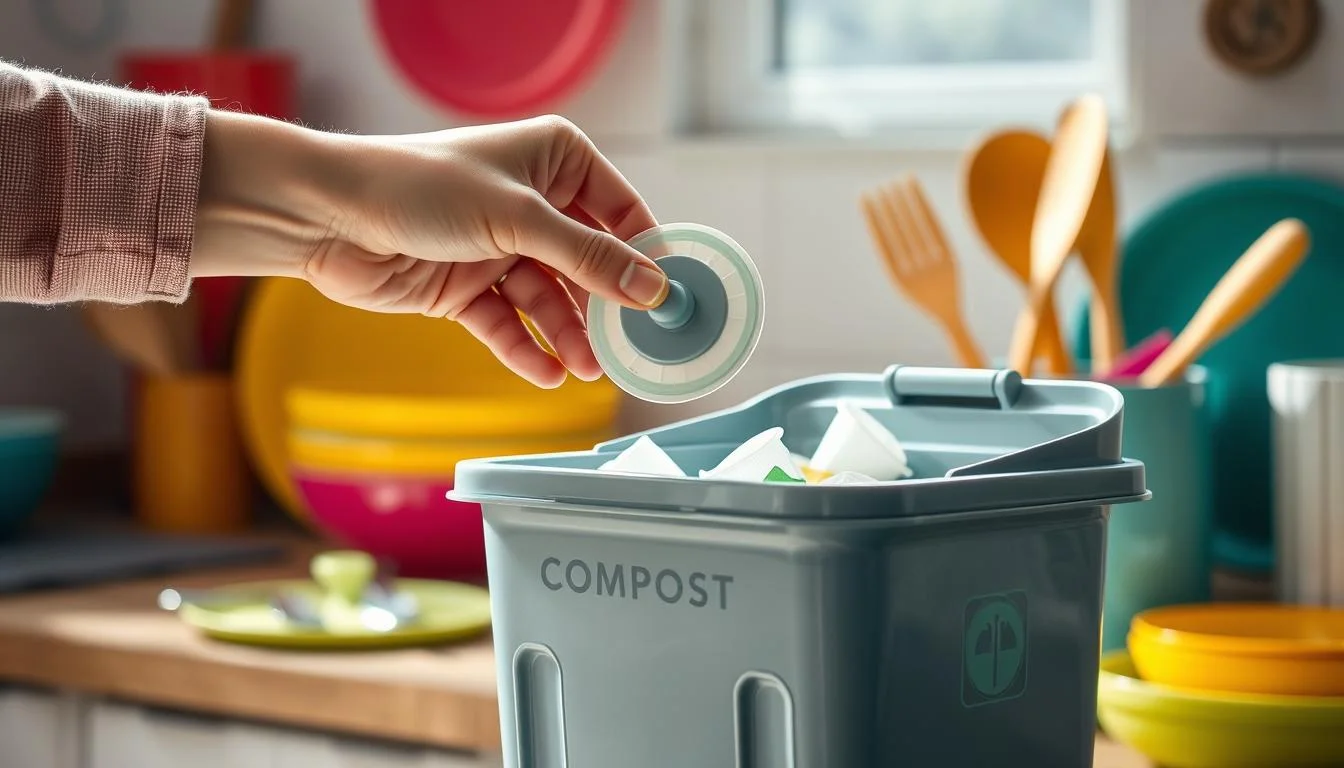
A colorful kitchen scene showcasing a hand disposing of a dishwasher pod into a compost bin, vibrant dishware and utensils in the background, soft natural lighting streaming through a window, emphasizing the eco-friendly aspect of disposal.
Maintenance Tips for Dishwashers
Keeping your dishwasher in good shape is key to avoiding drain clogs and keeping it running well. Regular care helps your dishes come out sparkling and keeps your plumbing clear. Here are some easy dishwasher maintenance tips to follow:
- Clean the Filters: The filters catch food bits and stop them from clogging the drain. Clean them often, as the maker suggests, to keep them working right.
- Check for Blockages: Look at the spray arms and drain basin for any blockages. These can stop water flow and cause clogs.
- Run Maintenance Cycles: Many dishwashers have self-cleaning cycles. Use these to clear out leftovers and keep your appliance care up to par.
- Address Issues Promptly: If your dishwasher makes strange noises or doesn’t clean well, fix it fast. Ignoring problems can make them worse later.
By doing these simple things, you can keep your dishwasher running well and avoid expensive clogs. Taking care of your appliances early on saves you time, money, and stress later.

A close-up view of a modern dishwasher being meticulously cleaned, with focus on the interior where dishwasher pods are placed, showing a sparkling clean filter and drain area, surrounded by tools like a scrub brush and a small bucket of soapy water, bright kitchen setting with soft natural lighting.
| Maintenance Task | Frequency | Benefits |
|---|---|---|
| Clean Filters | Monthly | Prevents clogging, improves water flow |
| Check for Blockages | Quarterly | Identifies and addresses potential issues |
| Run Maintenance Cycles | Quarterly | Removes residue, keeps dishwasher clean |
When to Call a Professional
Some plumbing and appliance issues can be fixed on your own. But, there are times when you should call a pro. Knowing when to get professional plumbing services, drain cleaning, or dishwasher repairs can save you time, money, and prevent more damage.
Here are some common situations where it’s smart to call a professional:
- Persistent or recurring drain clogs that don’t respond to DIY solutions
- Leaks or water damage that require more extensive repairs
- Suspected issues with the main sewer line or septic system
- Complex dishwasher problems, such as malfunctioning components or electrical issues
- Concerns about the safety or code compliance of your plumbing or appliances
Experts have the skills, tools, and gear to handle tough plumbing and appliance issues fast. They can also give you tips on how to keep things running smoothly. Don’t hesitate to call in the experts when you’re faced with a plumbing or dishwasher challenge that’s beyond your DIY capabilities.
“A stitch in time saves nine, and calling a professional plumber or appliance technician can prevent a small problem from turning into a major, costly one.”
When you reach out to a pro, be ready to share details about the issue. Talk about when it started, any steps you’ve taken so far, and any signs you’ve noticed. This info will help the technician figure out and fix the problem quicker.

A professional plumber in action, wearing a uniform and tools belt, examining a kitchen sink with plumbing tools scattered around, a partially opened dishwasher beside them, modern kitchen setting, focused expression, bright lighting, realistic details.
Conclusion
Understanding how dishwasher pods affect drain clogs is key to keeping plumbing systems working well. Dishwasher pods are handy but can cause clogs if not handled right. It’s important to use and dispose of them correctly.
To stop clogs, always follow the maker’s guide for using dishwasher pods. Make sure they fully dissolve and don’t stay in the dishwasher. Cleaning the drain filter and running a cleaning cycle helps too. This prevents blockages from happening.
Choosing the right dishwasher detergents and keeping up with plumbing maintenance helps homeowners. It also cuts down on environmental harm from cleaning. By picking sustainable cleaning methods and being proactive with plumbing, you can keep your home clean and free from clogs.
FAQ
What are dishwasher pods?
Dishwasher pods are a handy way to do laundry. They mix cleaning agents, enzymes, and other stuff into one easy unit.
Can dishwasher pods clog drains?
Yes, dishwasher pods can cause drain clogs if not thrown away right or used wrong.
What are the common causes of drain clogs?
Drains get clogged with food bits, grease, and wrong ways of throwing away dishwasher pods.
What are the signs of a clogged drain?
Signs of a clogged drain include slow draining, gurgling sounds, or water backing up.
How can I prevent drain clogs?
Use dishwasher pods right and keep your dishwasher and pipes clean to avoid clogs.
How can I unclog a drain?
Try natural fixes or chemical cleaners for clogs. Always follow the instructions and think about the planet.
What are the environmental impacts of dishwasher pods?
Dishwasher pods can harm the environment with chemicals and waste. Using greener options can lessen your impact.
What are the alternatives to dishwasher pods?
You can use liquid or powder detergents or eco-friendly ones instead of dishwasher pods.
How can I choose the right dishwasher pod?
Think about what you need to clean, your budget, and the planet when picking dishwasher pods.
How should I dispose of used dishwasher pods?
Dispose of used dishwasher pods right to avoid clogs and protect the environment. Look for recycling or follow waste tips.
What tips can I follow for maintaining my dishwasher?
Clean your dishwasher’s filters and fix problems fast to stop clogs and keep it working well.
When should I call a professional?
Call a pro plumber or appliance fixer if you have a tough clog or plumbing problem.

